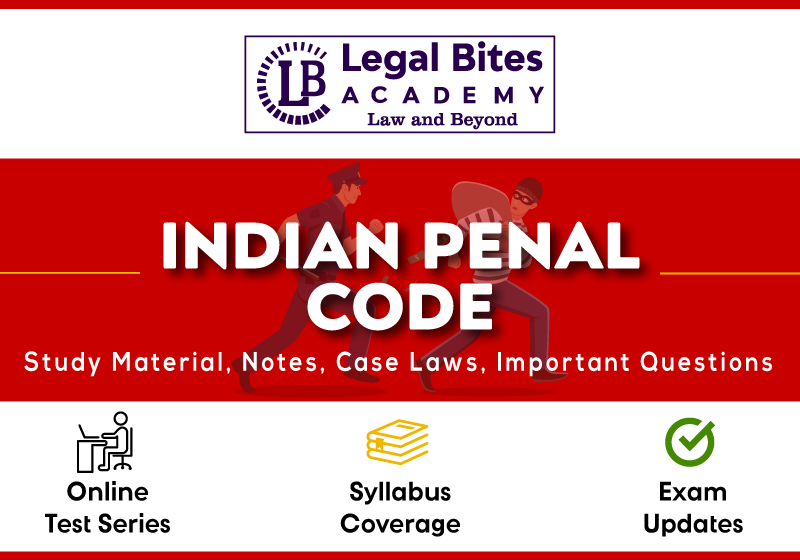Indian Penal Code (IPC) - Notes, Case Laws And Study Material
The Indian Penal Code (IPC), 1860 is the main criminal code of India. It is a comprehensive code intended to cover all substantive aspects of criminal law.

The Indian Penal Code (IPC), 1860, is the main criminal code of India. It is a comprehensive code that covers all substantive aspects of criminal law. The code was drafted in 1860 on the recommendations of the first law commission of India established in 1834 under the Chairmanship of Lord Macaulay. It came into force in the year 1862. The Code has been amended several times and is now supplemented by other criminal provisions.
Legal Bites has curated study material for readers who aim to learn the ins and outs of the Indian Penal Code. The ten modules of this course cover every aspect of the IPC.
Apart from the explanations of the various provisions under the Indian Penal Code, a 10-part series of important questions and extra study resources provided towards the end of the course will help law students who wish to crack university-level and competitive judicial exams.
Important articles and study material on the Indian Penal Code (IPC) – Click on the link to Read
Module I: Introduction
- Evolution of the Law of Crime over the Years
- The Indian Penal Code, 1860- A General Introduction and Background
- 20 Landmark Cases on IPC
- Indian Penal Code (IPC) MCQs for Law Aspirants: Solved High-Quality MCQs for Judiciary Prelims
- Crime and Its Elements
- The doctrine of Mens Rea and its application under IPC
Important Books and Practice Tests (Must Have)
- The Indian Penal Code by Ratanlal & Dhirajlal
- Indian Penal Code, 1860 Bare Act, along with Supreme Court Guidelines and Landmark Judgments
- 1000+ Detailed Questions MCQ Test Series for Competitions (Redirect to Law Aspirants)
Module II
- History of Punishments
- Kinds of Punishments. (Sec. 53-75)
- Commutation of Death Sentence and Life Imprisonment
Module III
- Insight into General Exceptions of IPC
- Mistake of fact and law
- Act done by Judges and authorities acting under him
- Accident and Necessity
- Acts Done By A Child And An Insane Person
- Act Done By A Person Under Intoxication
- Act Done With Consent
- Acts done for benefit of a person without his consent
- Act done by a person under compulsion
- Trivial acts
- Right of Private Defence
Module IV
- Offence of Abetment
- Criminal Conspiracy – Meaning, Nature and Scope
- Offences Against the State: Waging War, Assault, Escape and Sedition
Module V
- Offences against Public Tranquility. (Sec.-141-160)
- Offences affecting Public health, Safety, Convenience, Decency and Morals. (Sec. 228- 294A)
- Offences relating to religion. (Sec.- 295-298)
Module VI
- Offences relating to the Army, Navy and Air Force. (Sec. 131-140)
- Offences relating to Elections (Sec.-171A-I)
- Contempt of Lawful Authority of Public Servant (Sec.-172-190)
- False Evidence and Offences against Public Justice. (Sec.-191-229A)
Module VII
- Culpable homicide and Murder
- Attempt to Commit a Crime
- Abetment of Suicide: Meaning, Essentials, Burden of Proof & Presumption
- Death by Negligence: Meaning, Essentials, Difference & Punishment
- Dowry Death: Meaning, Essentials, Explanation & Presumption of Guilt
- Miscarriage: Meaning, Validity, Exceptions, Attempt & Abetment
- Hurt and Grievous Hurt: Concept and Explanation
- Wrongful Restraint And Wrongful Confinement: Overview
- Kidnapping and Abduction: Provisions and Differences
- Slavery and Forced Labour: Sections, International Perspective & Laws
- Sexual Offences Under Indian Penal Code
- Unnatural Offences: Essentials, Explanation & Constitutionality of 377
Module VIII
- Offences relating to Coins and Government stamps
- Offences relating to Weights and Measures. (Sec.-264-267)
- Offences relating to Documents and Property Marks. (Sec.-463-489)
Module IX
- Theft and Extortion
- Robbery and Dacoity: Concept, Explanation and Aggravated Forms
- Criminal Misappropriation of Property: Overview
- Criminal Breach of Trust: Introduction, Essentials, Explanation
- Fraudulent deeds and disposition of property
- Stolen Property: Offence, Essentials and Explanation
- Cheating: Concept, Essentials and Case Laws
- Mischief: Concept, Essentials and Detailed Explanation
- Criminal Trespass: Concept, Essentials and Overview
Module X
- Offences Relating to Marriage – Invalid Marriage, Bigamy, Elopement etc.
- Cruelty by Husband or Relatives of Husband | Section 498A
- Defamation – Meaning, Explanation and Exception
Important Mains/Long Questions and Answers for Judiciary, APO & University Exams
- IPC Mains Questions Series Part I: Important Questions
- IPC Mains Questions Series Part II: Important Questions
- IPC Mains Questions Series Part III: Important Questions
- IPC Mains Questions Series Part IV: Important Questions
- IPC Mains Questions Series Part V: Important Questions
- IPC Mains Questions Series Part VI: Important Questions
- IPC Mains Questions Series Part VII: Important Questions
- IPC Mains Questions Series Part VIII: Important Questions
- IPC Mains Questions Series Part IX: Important Questions
- IPC Mains Questions Series Part X: Important Questions
Other articles
- Common Intention And Common Object Under The IPC (Discussion and Comparison)
- Excusable General Exceptions under Indian Penal Code – Explanation with Important Case Laws
- Excusable General Exceptions under Indian Penal Code – Explanation with Important Case Laws
- Principle of group liability – Common Intention, Common Object and Unlawful Assembly
- Exceptions to Offence of Murder under Section 300 IPC
- Robbery and Dacoity – Meaning and important provisions
- Forgery For Purpose Of Cheating – Section 468 IPC
- Criminal Misappropriation and Criminal Breach of Trust
Analytical Study of Sedition Law in India and its Constitutional Validity
Your valuable feedback in the form of comments or any desired inputs are encouraged and always welcome. Every contribution toward a goal is valuable, regardless of how small it may be.

